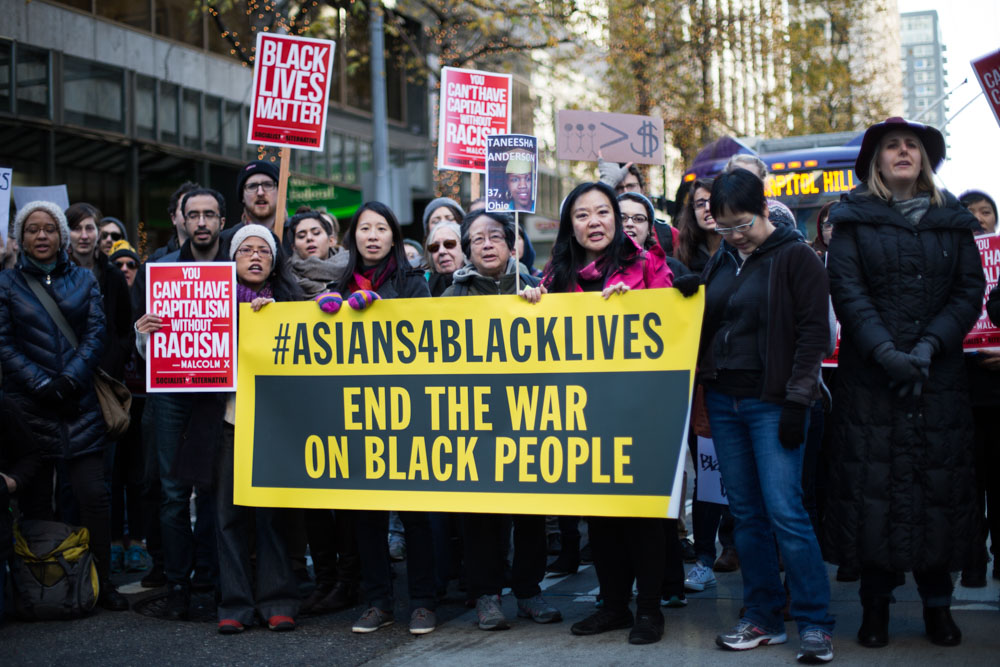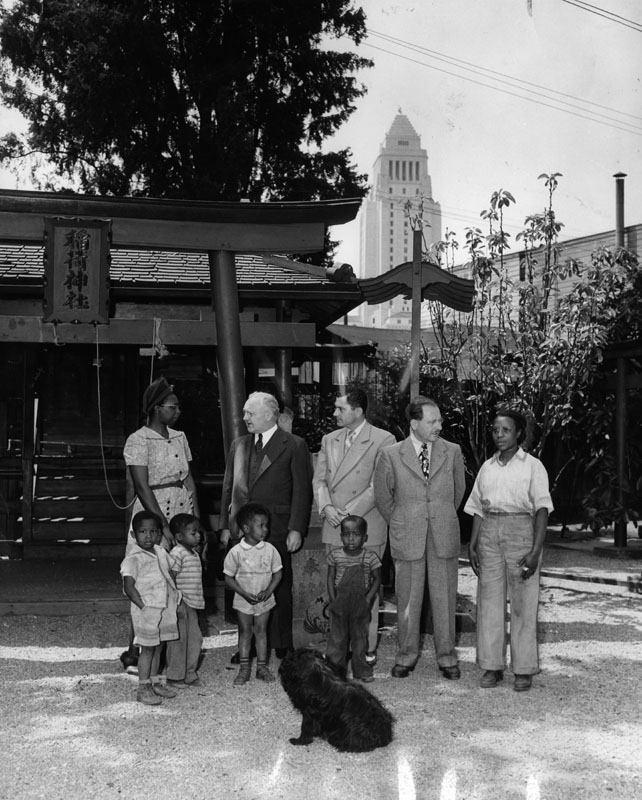Despite history, Japanese Americans and African Americans are working together to claim their rights
Densho
February 23, 2016 · 8:30 AM EST
By Natasha Varner

#Asians4BlackLives at a Seattle protest in support of Black Lives Matter in November.
Credit:
Jama Abdirahman/The Seattle Globalist
During World War II, the fates of Blacks and Japanese Americans crossed in ways that neither group could have anticipated.
While Japanese Americans were being forced to abandon the lives they'd built on the West Coast, African Americans were in the midst of the Great Migration out of the South. During the war, many Black migrants set their sites on the West Coast, where labor shortages in the defense industry brought new employment opportunities. Vacated Japanese American neighborhoods provided space for these new arrivals to establish themselves, but the process of putting down roots did not come easy.

In May, 1944, an abandoned Shinto shrine in newly formed Bronzeville. This is the Los Angeles neighborhood, Little Tokyo, where African Americans laborers were housed during Japanese American internment. Shown with Mayor Fletcher Bowron are a Bronzeville family (unnamed by the source), Dr. George M. Uhl, city health officer, and Nicola Giulli, chairman of the City Housing Authority.
Credit:
Otto Rothschild/Los Angeles Public Library Photo Collection
Take Los Angeles, for example. While Black laborers were welcomed in the city‘s defense industries, the lives and families they brought with them were not. Restrictive housing covenants barred people of color from living in white neighborhoods, so the newly vacated Japanese American neighborhood known as Little Tokyo was one of the few places that had space available to arriving African Americans.
About 80,000 people — most of them African American — took up residence in an area that had been home to approximately 30,000 Japanese Americans before the war. Little Tokyo was rechristened Bronzeville and Black-owned businesses replaced shuttered Japanese Americans establishments. The deserted Kawafuku restaurant reopened as Shepp's Playhouse, one of many night clubs that hosted the likes of Coleman Hawkins, T-Bone Walker and Herb Jeffries from the Duke Ellington band.
As the Black community began to thrive, overcrowding and governmental neglect led to an increase in crime and public health concerns in Bronzeville. The neighborhood was treated as a blight by the city of Los Angeles, with officials regularly issuing evictions and abatement notices in response to living conditions they deemed substandard. This was the cruel irony of the structural racism Black residents faced in wartime Los Angeles: They were punished for the inevitable outcomes of overcrowding that the city‘s restrictive housing covenants had caused.
Even as African Americans were struggling for their own basic rights in Los Angeles, individual stories document an incredible showing of support for incarcerated Japanese Americans. Takashi Hoshizaki, for example, recalled the shock and joy he felt at discovering his Black neighbors, the Marshalls, had traveled all the way to the Pomona detention facility in order to bring apple pie and ice cream to his family. Boyle Heights resident Mollie Wilson had a number of Japanese American friends in pre-War Los Angeles. Throughout their incarceration, she kept in regular contact with several of them, sending morale-boosting letters, cards, pictures and gifts.
More:
https://www.pri.org/stories/2016-02-23/despite-their-history-japanese-americans-and-african-americans-are-working
Skittles
(153,185 posts)recommended